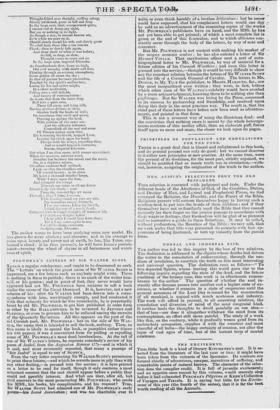POLWHELE'S LETTERS BY SIR WALTER SCOTT.
THIS is a regular catchpenny, and ought to be denounced as such. The "Letters" on which the great name of Sir WALTER SCOTT is impressed, are a few letters such as anybody might write. There is .nothing in them to publish; there is no mark of the writer him- self, or his genius ; and in point of fact, they never would have appeared had not Mr. POLWHELE been anxious to sell a book under the name of the Great Deceased. It is, however, not a new scheme of his : after Sir WALTER had been drawn into a corre- spondence with him, unwittingly enough, and had conducted it with that urbanity for which he was remarkable, he is perpetually beset by old Mr. POLWHELE, to get him published in some form or other by the BALLANTYNES, to be reviewed by JEFFREY and GIFFORD, or even to procure him to be enlisted among the recruits of the Quarterly Reviewers. All this appears on the part of the- old Cornish poet,. Mr. POLWHELE: but on the side of Sir WAL- TER, the name that is intended to sell the book, nothing. Then, as this name is likely to spread the book, or pamphlet rather (there are 108 pages), it was -a convenient form for puffing or repuffing some of MI POLWHELE'S Most dead lucubrations. At the.tail of one of Sir WALTER'S letters, he reprints somebody's review of his poem of Isabel, from the Augustan Review (.11)—and in which it is said, and most reverently repeated, that many a passage of "fair Isabel" is equal to any of Scow's. Even the very letter requesting Sir WALTER Scarfs permission to print -these letters,—and which he accords more in pity than with any other feeling,—is pressed into the service : it is here printed as a letter to be read for itself, though it only contains a most reluctant consent that the rest should appear before a public they could not possibly interest. And what are they, after all, but civil answers to the most persevering Mr. POLWHELE; who sends Ins MSS.; his books, his compliments,- and his -request? True, Sir WALTER SCOTT had admired one of Mr. POLWHELE'S . early poems—his- Local Association; and was, too charitable ever to write. or mien . think -harshly ,of a. brother, litOrateur: but he never could have 'supposed :that his complaisant letters would one day': be sold as an advertisement of the remaining copies of the works Mr. Por.wirELs's publishers have on hand, and the MSS. he has: not yet been able to get printed; of which a most complete list is ; given at the end of this fasciculus, and to which allusions con- stantly occur through the body of the letters, by way of not and comment. . .
But Mr. POLWHELE is not content with making his market of the magna nominis umbra ; he has also enlisted a letter of • Sir. , HUSSEY VIVIA.N. That meritorious officer sent a sort of auto- biographical letter to Mr. POLWHELE, by way of Material for a future edition of his Cornish Worthies ; and even this letter is • pressed into the service,—though it would be very difficult to show • any the remetest relation between the letters of Sir WALTER Scorr . and the life of a Cornish General of Cavalry. The letters to Mr. DOUCE, to Mr. TILT the publisher, to Messrs.HeantNo, &e., are the most insignificant ever written : they were, in fact, letters . which other men of Sir WALTER'S celebrity would have avoided • by a mere acknowledgment, knowing them to be nothing else than pa/7traps. But Sir WALTER was living by the Press, concerned in its success by partnership and friendship, and resolved upon doing this duty in the most gracious way. The resulkis, that the . chief part of these letters have before now been used as advertise- ments, and printed in that form.
This is not a reverent way of using the illustrious dead: and . the conviction that nothing more is meant by the whole heteroge- neous contents of this motley affair, than an elaborate puff, forces itself upon us more and more, the closer we look uPon its page's.



























 Previous page
Previous page